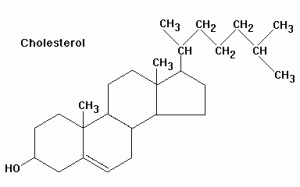 People with diabetes have a higher risk for heart disease, and high cholesterol can be a precursor for heart disease. On the other hand, cholesterol has many important functions, including waterproofing for the skin, serving as a component of cell membranes and bile, and a precursor for some of the steroid hormones.
People with diabetes have a higher risk for heart disease, and high cholesterol can be a precursor for heart disease. On the other hand, cholesterol has many important functions, including waterproofing for the skin, serving as a component of cell membranes and bile, and a precursor for some of the steroid hormones.
While cleaning my office (an ongoing endeavor), I came across an article about cholesterol myths. The article was from 2000, so I’m hoping many of the myths have already been dispelled, but just in case, here are the myths:
Avoiding high-cholesterol foods can lower people’s risk for heart disease.
Dietary cholesterol and blood cholesterol are the same thing.
People with diabetes should limit eggs to no more than four per week.
Dietary cholesterol and blood cholesterol are not the same thing. Dietary cholesterol only accounts for about 20% of the cholesterol in our bloodstream; the rest is made by the body from saturated fats that we eat. This is why it is the amount of saturated fats, and not dietary cholesterol, that makes a difference in risk for heart disease. As a result, eating one egg per day is typically ok.
LDL stands for “low density lipoprotein.” LDL carries cholesterol out to the tissues of the body. Because this cholesterol can end up causing “plaques” in the arteries, it is often called “bad cholesterol.”
HDL stands for “high density lipoprotein.” HDL takes excess cholesterol from the tissues of the body and carries it back to the liver where it is stored or excreted. Therefore, HDL is often called “good cholesterol.”
Making healthy choices – eating healthy foods and exercising – can help keep total cholesterol, LDL, and HDL in a healthy range.
Source: Zelman, K. (2000). Bio Science Reports Highlights from the American Association of Diabetes Educators 27th Annual Meeting, page 5.
